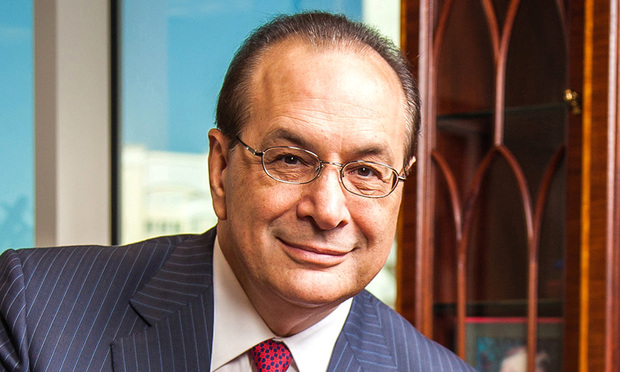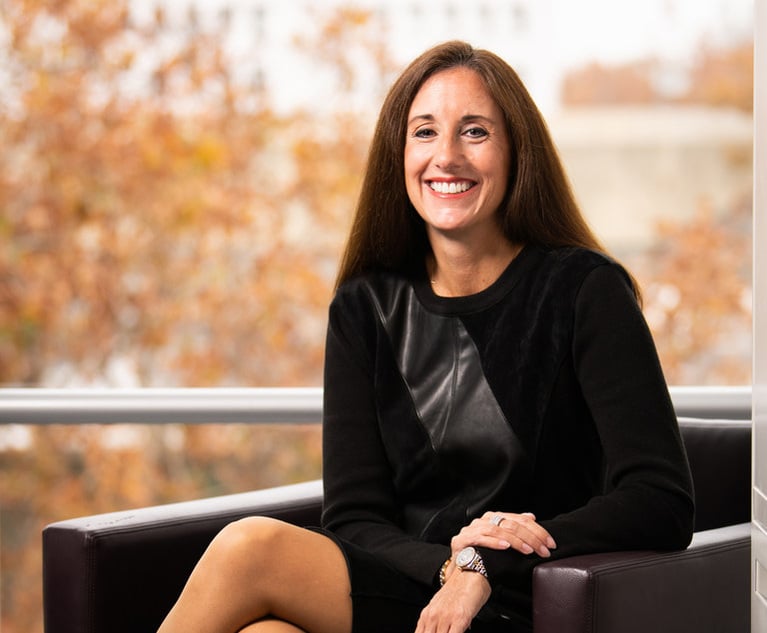Diversity Is So-So at Personal Injury Law Firms in South Florida
Personal injury law, an enclave of small firms, faces no more than societal pressure to reflect its multicultural community. In South Florida, the 10 largest personal injury firms have 10 to 44 attorneys by an informal count of attorneys listed on websites.
June 27, 2019 at 06:00 AM
6 minute read
 Robert Rubenstein, Rubenstein Law, Miami. Courtesy photo.
Robert Rubenstein, Rubenstein Law, Miami. Courtesy photo.
Robert Rubenstein makes diversity look effortless.
He runs Rubenstein Law, the largest South Florida personal injury firm by attorney head count at 44. Half of the attorneys at his Miami-based law firm are women, 39% are Hispanic and 14% are black.
Rubenstein, who started at Greenberg Traurig as a corporate attorney, offered personal experiences to explain his firm's leading role. He opened the firm when Miami's Bankers Club barred women and the Riviera Country Club in Coral Gables didn't allow Jewish members in the 1980s.
“I raised three girls, so maybe that gave me some head start on understanding how bright women are,” he said. His firm has advertised on Spanish-language television since opening in 1988, and it has a Spanish-language website. At one point, the firm counted attorneys and staff from 23 countries.
That's against a backdrop of increased focus on diversity in the legal profession. Federal district judges are pushing plaintiffs firms to place women and minorities in leadership positions in multidistrict litigation, and bankruptcy judges want to see more diversity in debtors counsel.
Personal injury law, an enclave of small firms, faces no more than societal pressure to reflect its multicultural community. In South Florida, the 10 largest personal injury firms have 10 to 44 attorneys by an informal count of attorneys listed on websites.
The firms start small as a rule with the founding partner or a group of like-minded litigators generating $1 million-plus verdicts and settlements. Gender diversity is often the first to be reflected in new hiring, and statistics indicate racial and ethnic diversity follows at a slower rate.
“Every firm needs to look at the makeup of their firm and make sure that diversity is a key factor,” said Lake “Trey” Lytal, a co-founder of 14-attorney Lytal, Reiter, Smith, Ivey & Fronrath in West Palm Beach. “Without diversity in a firm, you're not mirroring the community that you're working for.”
 Judd G. Rosen of Goldberg & Rosen. Courtesy photo.
Judd G. Rosen of Goldberg & Rosen. Courtesy photo.Judd Rosen of the 13-attorney Goldberg & Rosen firm in Miami said a Hispanic woman was the first attorney hired outside his family. He said the firm's hiring reflects its diverse client base and “the diverse city that we live in.”
Overall, Rubenstein Law is the most diverse personal injury firm based in South Florida and the only one with Hispanics in double-digit numbers.
By gender, Rubenstein is half female, and Lytal Reiter is 43% female. But combined, the 10 largest firms are only 30% female.
About 20% of attorneys are Hispanic, which sounds impressive except the Hispanic population is 69% in Miami-Dade County, 30% in Broward County and 23% in Palm Beach County. Rubenstein leads at 39% followed by Goldberg & Rosen at 38% and the Ferraro Law Firm in Miami at 36%.
Rubinstein and Lytal Reiter tie at 14% for black attorneys, below the rates for the African American and Caribbean population.
Heads of some smaller firms are not focused on diversity aside from citing their staff numbers. Scott Schlesinger of the Schlesinger Law Offices in Fort Lauderdale said he doesn't consider his 10-attorney team to be statistically significant in terms of diversity.
Leaders at personal injury firms stress minority hiring is skill-driven, not tokenism or window dressing for juries seated in South Florida's melting pot.
“It's not enough just to say I hired a bunch of minority people. You've got to give them the opportunity to succeed,” Rosen said.
In Trial
Trial team selections are not tied to the diversity of plaintiffs or juries, several law firm leaders said.
“I don't think it's enough to just have diverse people sitting by you at the table if they don't know what they're doing,” Rosen said. “It's nice if they can bring a culturally diverse persona to the case, but at the end of the day you've still got to perform.”
Rubenstein said, “We don't really try to match ethnicity. We just try to hire the best people.” As for juries, he said, “Don't assume that they want somebody who looks like them.”
Since the firm normally goes to trial with two-attorney teams, the firm accommodates and encourages women to take paid maternity leave, Rubenstein said. “We can always step in and help if somebody goes out on maternity leave.”
Lytal noted some of his firm's diverse attorneys have held leadership positions in affinity bars and the Florida Bar. Jason McIntosh is president of the F. Malcolm Cunningham Sr. Bar Association, a voluntary group founded by black attorneys in Palm Beach County in the 1970s, and Nelson Baez is a former president of the Palm Beach County Hispanic Bar Association.
Lytal is immediate past president of the Florida Justice Association, the state's largest plaintiffs bar group. He was succeeded by a woman, and she will be succeeded by a woman.
Some firms lacking in diversity still push to encourage it in the professional pipeline. Steinger, Greene & Feiner, with three white male founders and 13% Hispanic attorneys, offers a national scholarship to Hispanic law students. One recipient joined the 38-attorney West Palm Beach firm but not in its personal injury department. The firm's website speaks to its niche: injurylawyers.com.
Rubenstein stresses his firm's case assignments are not driven by diversity, but the firm's diversity influences applicants.
“They appreciate that we're a diverse firm. When they come to the firm, they see that there are so many different people from so many different areas,” he said. “This is a great place to find a lot of great people.”
The community itself exerts subtle pressure on law firms to get more diverse.
Lytal said, “I don't think there's any question that of anywhere in the country, South Florida ought to be leading the charge with diversity at law firms.”
Related stories:
Am Law Firms With Zero Black Partners—How Is This Possible in 2019?
This content has been archived. It is available through our partners, LexisNexis® and Bloomberg Law.
To view this content, please continue to their sites.
Not a Lexis Subscriber?
Subscribe Now
Not a Bloomberg Law Subscriber?
Subscribe Now
NOT FOR REPRINT
© 2025 ALM Global, LLC, All Rights Reserved. Request academic re-use from www.copyright.com. All other uses, submit a request to [email protected]. For more information visit Asset & Logo Licensing.
You Might Like
View All
EB-5 Rebounds After a Rocky Year: Challenges of 2024 Lay Groundwork for a Booming 2025

Greenberg Traurig, Holland & Knight Leaders Expect AI Investments to Jump in 2025
5 minute read
Leveraging the Power of Local Chambers of Commerce: A Second-Career Lawyer’s Guide to Building a Thriving Practice
5 minute readTrending Stories
- 1Relaxing Penalties on Discovery Noncompliance Allows Criminal Cases to Get Decided on Merit
- 2Reviewing Judge Merchan's Unconditional Discharge
- 3With New Civil Jury Selection Rule, Litigants Should Carefully Weigh Waiver Risks
- 4Young Lawyers Become Old(er) Lawyers
- 5Caught In the In Between: A Legal Roadmap for the Sandwich Generation
Who Got The Work
J. Brugh Lower of Gibbons has entered an appearance for industrial equipment supplier Devco Corporation in a pending trademark infringement lawsuit. The suit, accusing the defendant of selling knock-off Graco products, was filed Dec. 18 in New Jersey District Court by Rivkin Radler on behalf of Graco Inc. and Graco Minnesota. The case, assigned to U.S. District Judge Zahid N. Quraishi, is 3:24-cv-11294, Graco Inc. et al v. Devco Corporation.
Who Got The Work
Rebecca Maller-Stein and Kent A. Yalowitz of Arnold & Porter Kaye Scholer have entered their appearances for Hanaco Venture Capital and its executives, Lior Prosor and David Frankel, in a pending securities lawsuit. The action, filed on Dec. 24 in New York Southern District Court by Zell, Aron & Co. on behalf of Goldeneye Advisors, accuses the defendants of negligently and fraudulently managing the plaintiff's $1 million investment. The case, assigned to U.S. District Judge Vernon S. Broderick, is 1:24-cv-09918, Goldeneye Advisors, LLC v. Hanaco Venture Capital, Ltd. et al.
Who Got The Work
Attorneys from A&O Shearman has stepped in as defense counsel for Toronto-Dominion Bank and other defendants in a pending securities class action. The suit, filed Dec. 11 in New York Southern District Court by Bleichmar Fonti & Auld, accuses the defendants of concealing the bank's 'pervasive' deficiencies in regards to its compliance with the Bank Secrecy Act and the quality of its anti-money laundering controls. The case, assigned to U.S. District Judge Arun Subramanian, is 1:24-cv-09445, Gonzalez v. The Toronto-Dominion Bank et al.
Who Got The Work
Crown Castle International, a Pennsylvania company providing shared communications infrastructure, has turned to Luke D. Wolf of Gordon Rees Scully Mansukhani to fend off a pending breach-of-contract lawsuit. The court action, filed Nov. 25 in Michigan Eastern District Court by Hooper Hathaway PC on behalf of The Town Residences LLC, accuses Crown Castle of failing to transfer approximately $30,000 in utility payments from T-Mobile in breach of a roof-top lease and assignment agreement. The case, assigned to U.S. District Judge Susan K. Declercq, is 2:24-cv-13131, The Town Residences LLC v. T-Mobile US, Inc. et al.
Who Got The Work
Wilfred P. Coronato and Daniel M. Schwartz of McCarter & English have stepped in as defense counsel to Electrolux Home Products Inc. in a pending product liability lawsuit. The court action, filed Nov. 26 in New York Eastern District Court by Poulos Lopiccolo PC and Nagel Rice LLP on behalf of David Stern, alleges that the defendant's refrigerators’ drawers and shelving repeatedly break and fall apart within months after purchase. The case, assigned to U.S. District Judge Joan M. Azrack, is 2:24-cv-08204, Stern v. Electrolux Home Products, Inc.
Featured Firms
Law Offices of Gary Martin Hays & Associates, P.C.
(470) 294-1674
Law Offices of Mark E. Salomone
(857) 444-6468
Smith & Hassler
(713) 739-1250







